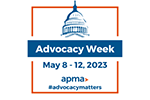2023

MATE Act Update: APMA Provides Testimony at HHS' ISUDCC Meeting
APMA presented oral testimony to HHS' Interdepartmental Substance Use Disorders Coordinating Committee (ISUDCC) on June 5, requesting that APMA and CPME be approved as a provider and accrediting entity, respectively, for the new DEA MATE Act requirements.

New Direction on Use of JW/JZ Modifiers Starts July 1
Effective July 1, providers and suppliers are required to report the JZ modifier on all claims that bill for drugs and biologicals from single-dose containers that are separately payable under Medicare Part B when there are no discarded amounts.

2023 State Advocacy Forum - Young Physician Advocate Scholarship Applications Due May 31
Registration for the 2023 State Advocacy Forum will open soon! We ask that all state components and societies share the application provided here with their young physician members and encourage them to apply by the May 31 deadline.

Cigna Delays Implementation of Modifier 25 Policy: What You Need to Know
APMA joined with AMA and other specialty medical societies to submit a comment letter regarding Cigna’s modifier 25 policy.

APMA Formally Expresses Concern to SAMHSA over DEA MATE Act Omissions
Last week, APMA submitted formal comments to the Substance Abuse and Mental Health Services Administration (SAMHSA), expressing our ongoing concerns related to the DEA MATE Act, and following up our meeting on April 28.

Implementation Date for CPME 820, CPME 830, Revised Fellowship Documents
The implementation date for the revised fellowship documents, CPME 820 and 830, is July 1.

DEA Announces COVID-19 Telehealth Flexibilities Extension
The DEA recently released a temporary rule extending COVID-19 telehealth flexibilities for the prescription of controlled substances.

Alabama Scope of Practice Modernized to Include the Ankle
APMA is pleased and proud to announce that the Alabama Podiatric Medical Association (ALPMA) has succeeded in its long-term efforts to modernize the Alabama scope of practice statute. Alabama Governor Kay Ivey (R) signed Senate Bill 28 into law on May 3, updating podiatrists’ scope to include the ankle. The bill will take effect August 1.

DME Stakeholders Meeting
Among the topics discussed at the meeting were the Same or Similar update, the transition to NPE East/NPE West, competitive bidding, and legislative updates.

APMA Supports Appropriate Code Values at RUC Meeting
APMA representatives participated in the AMA/Specialty Society RVS Update Committee (RUC) meeting April 26–29 in San Diego.

APMA Meets with SAMHSA; New DEA MATE Requirements Resource Page
APMA met with the Substance Abuse and Mental Health Services Administration on April 28 to discuss regulatory avenues for correcting the omission of references to podiatric physicians, APMA, or CPME in its original statutory language and subsequent guidance. We have created a resource page for members.

APMA Delivers Another Successful Virtual Coding Seminar--Recording Coming Soon
APMA’s highly anticipated Spring Virtual Coding Seminar was held on Saturday, April 22.

APMA Reviews and Updates Private Insurance, Medicare Advantage Strategy
Last week, in conjunction with its Health Policy and Practice Committee Initiatives and Strategic Plan, APMA met with its Private Insurance/Medicare Advantage consultant to review and update its strategy related to private insurance matters.

OIG To Review Remote Patient Monitoring
The US Office of the Inspector General (OIG) has announced its plan to review Medicare fee-for-service claims and Medicare Advantage encounter data for remote patient monitoring services.

Contract Requirement for Providers Without DMEPOS In Their Own Inventory
At this time, the NPEast and NPE West DMEPOS contractors may require suppliers to provide copies of contracts that establish their relationship with vendors at the time of enrollment/re-enrollment application.

APMA Comments to NCQA on Development, Testing of Diabetic Foot Assessment, Follow-Up and Electronic Clinical Quality Measures
Last week, APMA submitted comments in response to the solicitation by Mathematica to develop and test the Diabetic Foot Assessment and Follow-Up clinical quality measure (CQM) and electronic clinical quality measure (eCQM).

Register for the 2023 APMA Legislative Conference Today
Mark your calendars for APMA 2023 Advocacy Week, May 8–12, to advocate for the future of the profession.

DEA MATE Requirements Update: Where to Receive Education in Interim of Resolution
While APMA is working with Congress to obtain a technical correction for the law as well as outreach to SAMHSA to add APMA as an approved entity, we have identified a pathway forward for members whose renewal for licensure is on or shortly following the June 27 deadline.

APMA Renames Award in Memory of Franklin Kase, DPM
APMA is deeply saddened by the loss of California member Franklin Kase, DPM. Dr. Kase died in March after a protracted illness. Dr. Kase was extremely active in California and at the national level in podiatry’s payer advocacy efforts. He was instrumental in APMA’s victory with Anthem, where an onerous policy would have significantly cut reimbursements for evaluation and management (E/M) services billed with CPT modifier 25.

Trigger Point Injections CAC Meeting
All seven Part B Medicare Administrative Contractors have announced a multi-jurisidictional CAC meeting to discuss the evidence relating to trigger point injections.